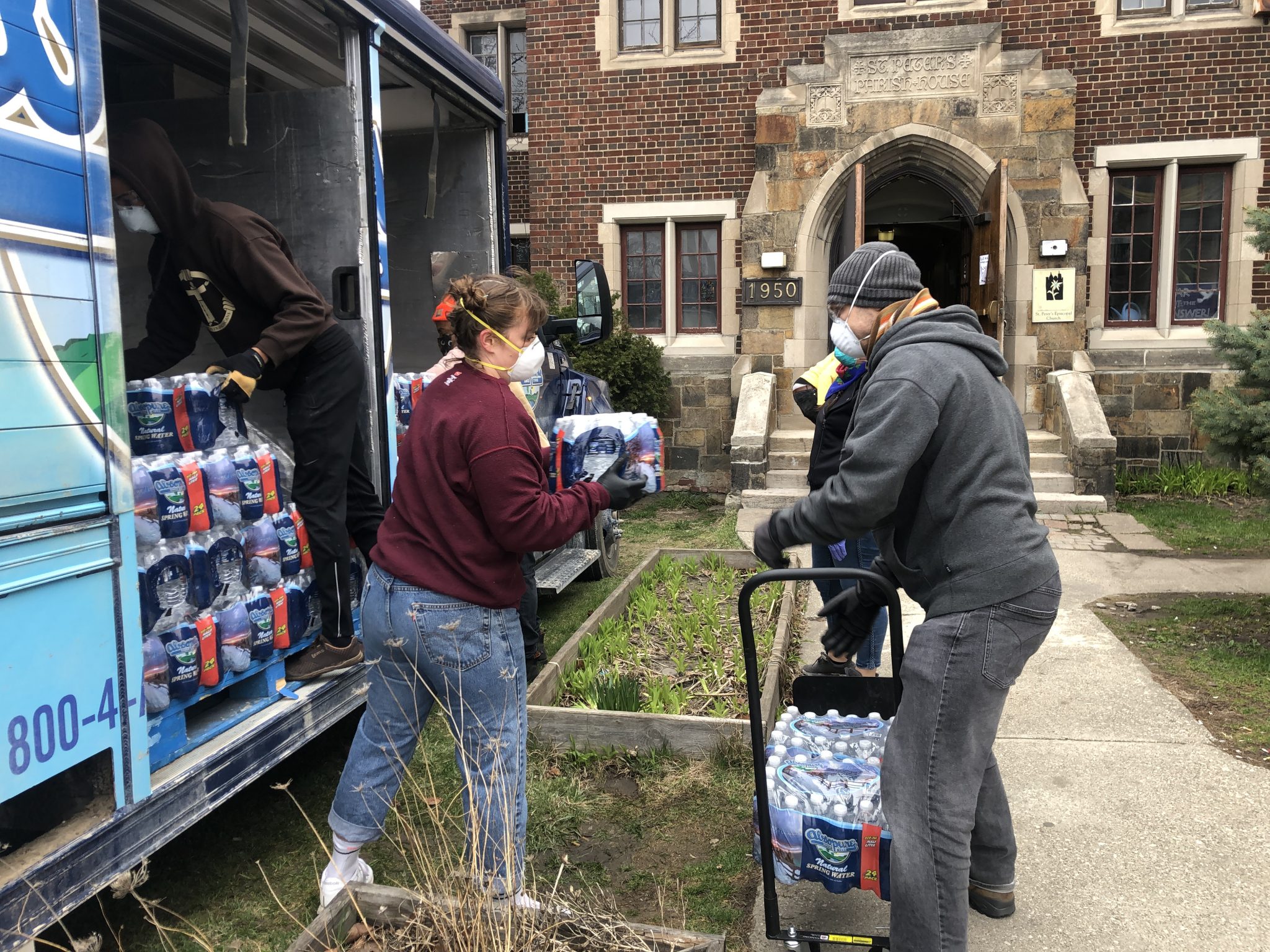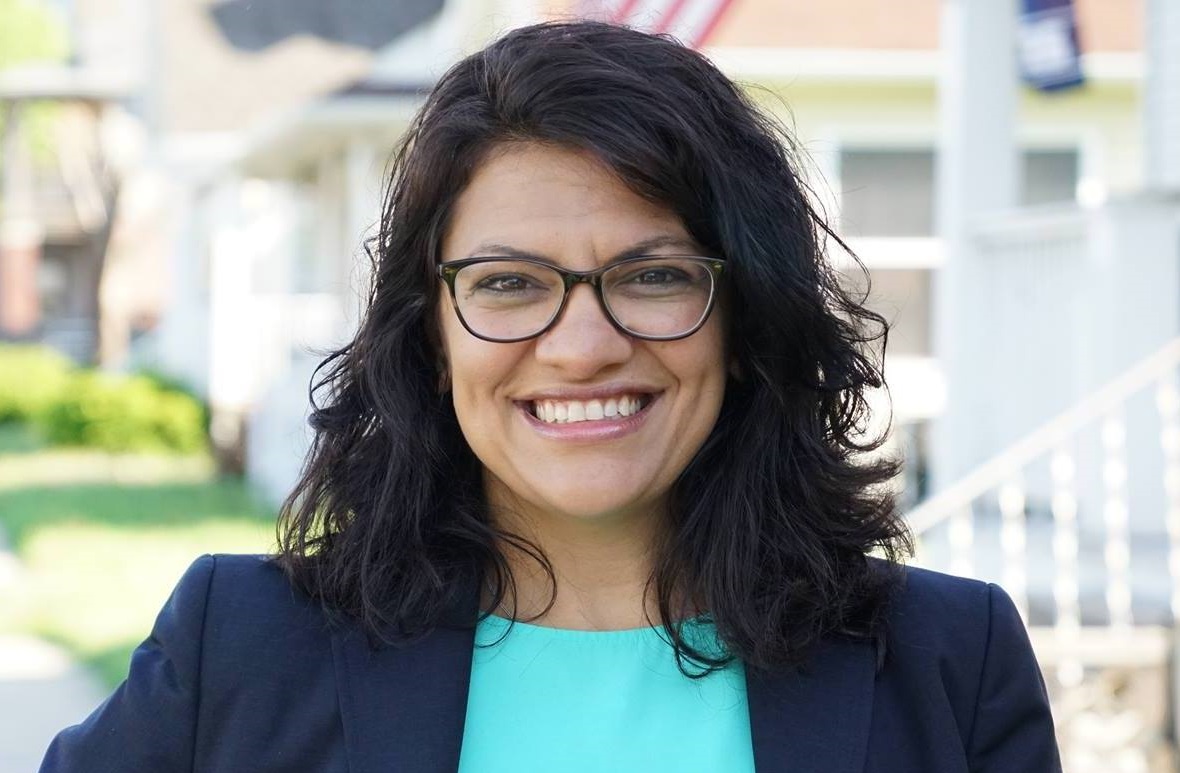Tlaib, Dingell Introduce Legislation to Stop Water Shutoffs During Coronavirus Pandemic
“The Emergency Water is a Human Right Act” seeks $1.5 billion in grants to assist low-income households nationwide.

We the People of Detroit distributes bottled water during a water shutoff in January 2021. Photo credit: Eli Newman, WDET.
Representatives from Michigan are re-introducing legislation in Congress that would end water shutoffs during the coronavirus pandemic. “The Emergency Water is a Human Right Act” would provide grants to low-income households to help pay for the public utility. Congresswoman Rashida Tlaib is introducing the bill together with Congresswoman Debbie Dingell.
“People are truly not able to afford water, which has become increasingly more expensive,” says Tlaib. “Many of my residents are very much struggling living check by check.”

The bill calls for $1.5 billion in federal funding for the effort and is co-sponsored by 73 members of the House of Representatives.
“Denying any of our neighbors the ability to wash their hands or drink safe, clean water is unconscionable and immoral,” said Dingell in a statement. “Congress must immediately enshrine water as an undeniable human right afforded to all people who call this nation home.”
Advocacy groups are endorsing the legislation as coronavirus-era protections against water service interruptions come to an end. A statewide moratorium on shutoffs in Michigan is set to expire on March 31.
“Far too many families have had to go without running water during the pandemic, but utility shutoffs are not new,” said Justin Onwenu, an organizer with the Sierra Club in Detroit, in a statement. “The pandemic has simply highlighted an injustice that has persisted for years. Access to clean water is a human right, and it is more important than ever that we protect that right, as the health of hundreds of millions of U.S. residents depends on hygiene and handwashing.”
“15 million people in the United States experience water shutoffs — this is one out of every 20 households.” — Rep. Rashida Tlaib
More than 140,000 homes in Detroit have experienced a water shutoff over the last decade. The American Civil Liberties Union of Michigan and NAACP are seeking to end water shutoffs through litigation, recently appearing in federal court to oppose a motion by the state to dismiss the lawsuit. Governor Gretchen Whitmer is named in the complaint.
“Her administration made the ludicrous assertion that there is no connection between water shutoffs and the spread of disease,” said Mark Fancher, an attorney for the ACLU, following the hearing.
Mayor Mike Duggan, who is also named as a defendant in the ACLU and NAACP lawsuit, has pledged to end the city’s shutoff policy by 2022 as the city seeks government and non-profit assistance for water affordability. Activists are in the process of adding language to establish water security in a new draft of the Detroit city charter.
But Tlaib says her legislation can address the issue nationally.
“This is a critical step for the federal government to come in, especially during this pandemic,” said Tlaib. “We have to make sure that many of our families have access to running water.”
Click on the audio player above to hear Rep. Rashida Tlaib discuss the legislation.
WDET’s Eli Newman spoke with Rep. Rashida Tlaib to learn more about the legislation. Read excerpts, edited for clarity, below:
Newman: This isn’t the first time that you’ve introduced this kind of legislation. In the last COVID relief package, there was $638 million for water relief. Why was that not enough?
Tlaib: It should actually be at $4 billion, but we compromise and said let’s come at $1.5 billion in grants to assist low-income households to help them get their water bills paid off and get them connected to water right away. Families have been left without clean, safe, affordable water simply because they can’t afford the increased water rates. It is life. It is so incredibly important for people that need to wash their food, to cook food, to wash their bodies, their clothes. It is essential. And to allow people to live in those inhumane conditions solely because they’re poor, solely because they can’t afford water, it’s just wrong. Congresswoman Dingell and I are very committed to making sure that the Emergency Water is a Human Right Act is passed.
I think you just pointed to why this issue of water assistance is really an issue that has existed even before the COVID-19 pandemic. Is this legislation meant to exist post-pandemic, when we are in recovery?
Yes. This was going to happen, even if the pandemic didn’t exist. We are just now moving with a sense of urgency. This is going to be a fund that exists that continues to be funded. I want something that is sustainable and that will actually get to the root causes of water shutoff. I’m confident that my colleagues are with me. Speaker Nancy Pelosi has expressed strong support for this. Senate Majority Leader Chuck Schumer in the last term expressed support for this. At the time, Vice President Kamala Harris, when she was a U.S. Senator, was in support of this bold action to address water shutoffs. I know that they know moratoriums are not enough. They know that we need to be able to fund that access and to fund measures that will get to the root causes of water shutoffs in our country.
It sounds like you have the support of Democratic leadership, but this piece of legislation has a $1.5 billion price tag. How likely do you think it is that you’re going to get bipartisan support?
I already got bipartisan support when the Emergency Water is a Human Right Act was in the HEROES Act. We have been fortunate that many of my colleagues realize access to water is not a partisan issue. It’s something of a human issue and that everyone deserves access to water. In many Republican, Democratic districts, whatever you want to call them, they’re all just districts made up of people that are impacted by the lack of access to water.
Related: How Coronavirus Changed Detroit’s Water Shutoff Policy
Trusted, accurate, up-to-date
WDET is here to keep you informed on essential information, news and resources related to COVID-19.
This is a stressful, insecure time for many. So it’s more important than ever for you, our listeners and readers, who are able to donate to keep supporting WDET’s mission. Please make a gift today.

